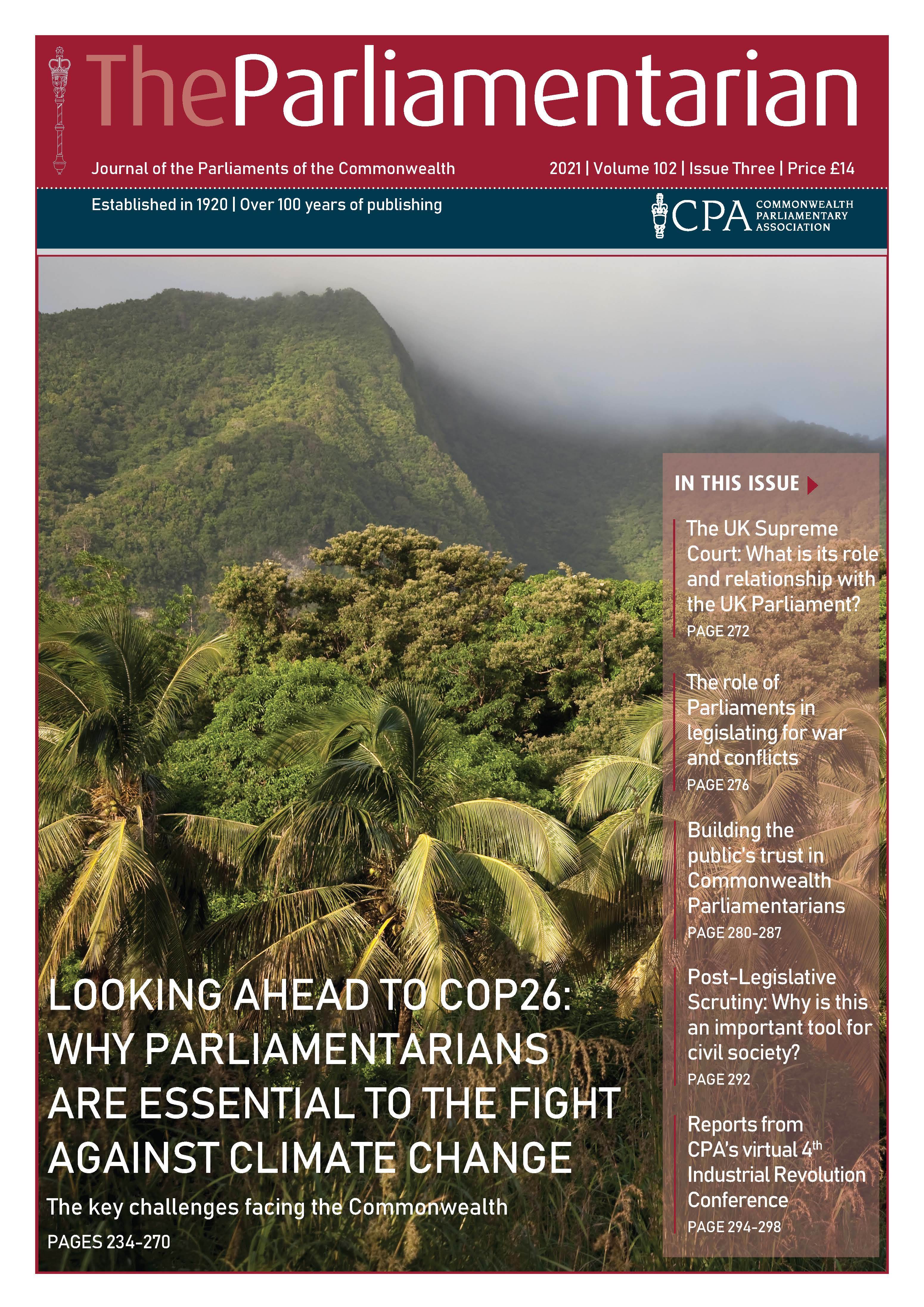The Parliamentarian is the quarterly Journal of Commonwealth Parliaments published by the Commonwealth Parliamentary Association (CPA) and features articles, news and legislative reports written by Members of Parliament, parliamentary staff and international experts across the Commonwealth about a wide range of global issues. Click here to download the latest issue.

Big problems, small Parliaments: Tackling climate change as a small jurisdiction
This blog is part of the CPA’s blog series, ‘Climate change challenges for the Commonwealth'. The series was published as the COP26 conference takes place in Glasgow in November 2021. You can find all the articles in the series here.
The CPA Small Branches Chairperson, Joy Burch, Speaker of the Australian Capital Territory highlights the struggle small Parliaments can face in meaningfully fighting climate change while their capacities to do so are increasingly tested by that same changing climate.
Climate change is a tough issue for any Parliament to tackle, but what makes it different for small jurisdictions? The CPA Climate Change and Small States toolkit sets out several reasons for this. What it boils down to is that small states are disproportionately affected by the effects of climate change but cannot easily make any impactful difference to mitigate them. The tragedy of this is that those same states’ contributions to global emissions are negligible.
Because of this, small Parliaments’ best bet is to pursue adaptation-focused legislation which aims to adapt to the effects of climate change. This is not to say mitigation isn’t valuable. It instead reflects the reality for small states that adapting to protect what little we have against the impacts of climate change must be the priority.
Impactful legislating
As small Parliaments, our limited resources demand we employ a bit of creativity in how we legislate for impactful climate action. How each state achieves this is determined by their unique environments and character. For example, on Prince Edward Island, one of Canada’s Maritime Provinces, an ambitious carbon capture-by-reforestation program is being pursued alongside work to adapt to increasingly frequent coastal flooding. While in Vanuatu, the combination of adaptation education with customary knowledge is successfully empowering ni-Vanuatu ownership of climate action projects.
In my own jurisdiction, the Australian Capital Territory, we’ve achieved practical-yet-ambitious targets through continued cross-party cooperation. Our focus on energy, previously our largest emissions source, saw us reduce our emissions 45% on 1990 levels and become the first city outside of Europe to be powered entirely by renewable energy. The tri-partisan work which achieved this will be key to any future work.
Some Legislatures also choose to couple legislative action with symbolic recognition of the said action’s urgency. Among the CPA Small Branches Network, five Parliaments – Gibraltar, the Isle of Man, Jersey, Yukon, and the ACT – have declared climate emergencies to date. Practical and well-implemented law-making is central to how small Parliaments are meaningfully contributing to the fight against climate change. However, this fight isn’t always one-sided.
When the climate fights back
Our climate is lashing out with increasing frequency and ferocity, of which small jurisdictions overwhelmingly bear the brunt. These catastrophic events impact small Parliaments’ abilities to affect change in three distinct ways.
First, damage caused by major climate events reprioritises political attention and funding. In the aftermath of any destructive event, focus understandably turns to providing relief and, later, social and economic recovery. Yet due to limited capacities, this can take small jurisdictions much longer than larger ones. This in turn delays the politically viable return to legislating on climate change.
Next, these climate events can decimate small states already limited economic capacities, drastically inhibiting their ability to rebuild and recover. Short-to-mid-term internal displacement after disasters significantly reduces the available workforce needed for rebuilding and recovery. Dominica experienced this in the aftermath of 2017’s Hurricane Maria, which damaged or destroyed 90% of housing stock and displaced 47% of its population.
Similarly, climate change and major climate events can incapacitate many of the limited industries which small jurisdictions rely on. This has been most apparent in tourism, but the future risks of ocean acidification, permafrost thaw, and drought threaten small jurisdictions worldwide, from Nunavut to St Helena. Reduced income and displaced workforces from such events disempower small states’ efforts to adapt to and address climate change.
Lastly, major climate events are increasingly disrupting parliamentary sittings and operations. The level of disruption varies. At the lower end of the scale, it is an inconvenience, such as when smoke from the 2019-20 bushfires forced our Legislative Assembly to close for a day. Yet at the other end it can destroy entire Parliaments, as Tropical Cyclone Gita did to Tonga’s Fale Alea in 2018.
What can be achieved by a small jurisdiction?
It is well understood that Parliaments have key roles in passing laws, responding to social and economic needs of their community and in setting the policy framework that guides its own and private sector responses.
It is also understood that the role of Speaker/Presiding Officers is to ensure the good function of the Parliament and that it operates without hindrance from the Executive. That said many Speakers are also members of a political party and as elected Members contribute to policy devolvement.
Climate change is an issue which will dominate the agendas of Commonwealth Parliaments for at least the next decade. As can be seen from the above, CPA Small Branches are and will continue to make significant contributions to further our collective knowledge of this important issue.
This blog post is an extract from a longer article in The Parliamentarian (2021 Issue Three) - to read the full article please click here.
This blog is part of the CPA’s blog series, ‘Climate change challenges for the Commonwealth'. The series was published as the COP26 conference takes place in Glasgow in November 2021. You can find all the articles in the series here.




